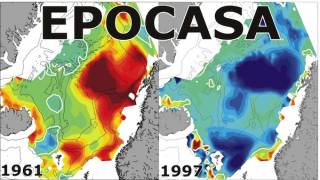Project page - EPOCASA
EPOCASA

The primary objective of EPOCASA is to develop a dynamical climate prediction system to assess predictability on seasonal-to-decadal timescales in the North Atlantic Sector and Arctic (NAS), which are areas of relevance for Norway.
The challenge
The rise of global surface temperatures slowed during the last decade. The northern hemisphere saw a spate of harsh winters. The 2012/2013 winter, for example, saw extremely cold temperatures and high snowfalls across Europe and eastern North America, and one of the driest March in Western Norway since reliable observations started around 1900. At the same time the Arctic experienced extreme warming and accelerated sea ice loss, culminating in the record-low of September 2012.
Anthropogenic global warming may explain much of the persistent changes over the northern hemisphere, but not the large year-to-year variations. Nor may it entirely explain the strong decadal fluctuations in northern hemisphere climate observed over the last century.
Project Objectives
To what extent can climate in our region be predicted on timescales from seasons to a decade? EPOCASA’s key objective is to address this question. The project focuses on the North Atlantic Sector and the Arctic has the following specific goals:
- To improve the understanding of key mechanisms for predictability
- To develop a seasonal-to-decadal prediction system, including application of an advanced initialisation scheme
- To better quantify the contribution of internal climate dynamics and external factors in observed climate variability during the historic record
- To reduce uncertainties in future predictions (regionally and globally) through initialisation and a better representation of key processes
EPOCASA also aims to strengthen national and international cooperation.
Methodology
EPOCASA will develop a dynamical climate prediction system that focuses on the North Atlantic Sector and Arctic. The system couples an advanced data assimilation method (the Ensemble Kalman Filter) to the current version of the Norwegian Earth System Model, building upon developments initiated at the Center for Climate Dynamics at the Bjerknes Center. EPOCASA will apply the prediction system to assess the extent to which the recently observed changes are predictable.
EPOCASA is motivated by several recent advances:
- The demonstration that subpolar North Atlantic sea surface temperature (SST) are predictable on seasonal-to-decadal timescales, with observed links to the Nordic Seas and Arctic
- The potential role of stratosphere-troposphere interactions in the atmospheric response to tropical and extra-tropical SST, sea ice, and snow cover variations
- The need to reduce model systematic error and develop more advanced forecast initialisation techniques.
We will analyse observations and perform extensive model simulations to assess the potential of these factors to enhance climate prediction in the region.
Expected results
EPOCASA will develop the first seasonal-to-decadal climate prediction capability in Norway, paving the way for operational climate prediction that will be of direct benefit to Norwegian society and economy. Scientific research carried out in EPOCASA will furthermore lead to a deeper understanding of the factors controlling climate in our region, and its predictability on timescales from seasons to a decade.
